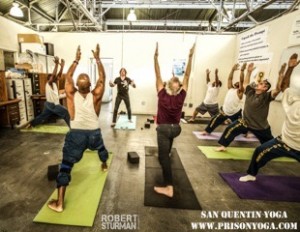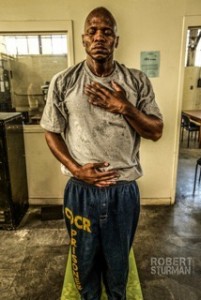
Eric Paskel teaches yoga to inmates at San Quentin, creating a “prison break” without ever leaving the prison.
It was not a hard sell when my teacher, Swami Parthasarathy, told me during one of our first meetings, “The whole world is a prison, and your only job in life is to get the hell out.” I did not even have to ask what he meant or where he got that information, because I knew I have always been in some kind of cell or another. According to Vedantic philosophy, freedom is defined by one’s happiness not being connected to any external agencies, i.e., people, places, and things (the world). Bondage (prison) is defined by one’s happiness being dependent on people, places, and things.
Consider Your Own Prison
I have never once, not even for a split second, felt happiness that was not connected to something in some way. Check it out: ask yourself if you are happy. If you said yes, there is most likely a reason linked to it. Hence, your happiness is because of something, someone, somehow. Believe it or not, that is not happiness. Why, you ask? Because whatever is making you happy has a shelf life! It may go away, or the pleasure you get from it will fade. But one way or another, everything in this world has a shelf life, even you! Ask your friends and family the same question, and if they respond, “I’m great,” ask them why they are happy. They will have a reason which will not be, “I Am.”
I do not care how big your prison is or what amenities you have. I do not care if you have a television and a nice kitchen in your cell. I care about getting out of jail! Sure, it may be easier gaining the grace I am looking for in the suburbs of Los Angeles, where I live, than it is in San Quentin State Prison. But every day, Beverly Hills folks imprison themselves and in San Quentin, inmates are finding freedom.

Finding Freedom in San Quentin
I visited San Quentin in March after having lunch in Marin County, California, with my yoga agent and friend Elana Maggal and photographer Robert Sturman, who made this visit/yoga class happen. The irony of pulling into San Quentin five minutes after dining in one of the most expensive suburbs in the country was astounding. Yet knowing what I know about freedom, I smiled and said to myself, “You are just leaving one prison for another.” I prepared nothing and had zero information about what was expected of me, not even how long the class was going to be. I quickly discussed with James Fox, the head of the Prison Yoga Project, what I could expect from the inmates. Before I could take it in, we were standing in the yard of the infamous prison, without an armed guard. Our only armor was two yoga mats!
The students entered class on time, participated in setting up the room (there were tables and chairs everywhere), introduced themselves, and then sat peacefully on their mats. The mats had to be set up in a semicircle, because the students are on high alert when someone is behind them. I was not allowed to walk around the class or adjust anyone. “Doing that could trigger a PTSD or fight-or-flight response, ending in harm,” I was told. I was, as were the students, completely at ease. The students were fully engaged throughout the entire class. The level of commitment on their mat was second to none. They listened to every word I said, and I could see them processing the philosophy in every breath. Yoga was being practiced! It was not in the poses. They understood all too well that yoga is not about posing. It’s about getting out of jail! We created a prison break without ever leaving the prison. I could feel their deep hunger for personal freedom, and that was their gift to me. Teaching yoga to anyone, anywhere, is a joy for me, but it’s not always easy. Teaching at San Quentin was effortless.
Finding Freedom Everywhere Else
In suburbia, there is a different kind of prison. It’s one where there are no bars, yet many are stuck in a box. The difference is awareness. The student in jail knows he is there. If he wants out, there is an attitude and energy that drives him. As for the rest of us, we do not see ourselves in prison, so there is no sense of urgency. There is a lackadaisical approach to life, to our yoga practice. Even those reading this are reading it for the most part for their entertainment, not their enlightenment. Therefore, teaching yoga to those who are unaware that they are not free is like prying gum off the bottom of a shoe. It’s a tough job and being a yoga teacher does not in any way place you above the people you are teaching. I see it the way the yoga scriptures lay it out: We are all in the same boat, until we are completely out of the boat.
I know one person who is free. But because I am not, I cannot really be sure of it. I just know he is different, and everyone else I have ever come across is the same. A conditioned person cannot know what being unconditioned is like until they are unconditioned. It’s like sobriety. An alcoholic cannot possibly understand sobriety, until he is sober. I am not sober, so to speak, and that brings me back to the beginning of this story … our only job in life is to break out of jail, to know our infinite self, to reach our ultimate state of pure peace, bliss, and wholeness.
I want to be free and by God, it’s difficult. I feel the bars even though I cannot see them. They come up when I lose what I love, or get something I do not want. The walls cave in when I feel threatened that something of “mine” will be taken away. I throw myself into solitary when I covet the careers of others or cast stones at those I do not approve of.
There is much to do in order for me to gain my freedom. The good news is I have the key: it’s me!
Be sure to catch the Live Be Yoga Tour when it stops by Eric Paskel’s Electric Soul Yoga studio in L.A. on July 9th and visits San Quentin later this summer.
From: www.yogajournal.com